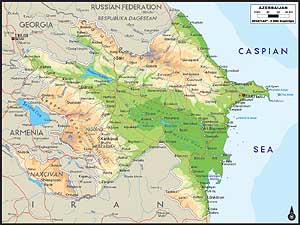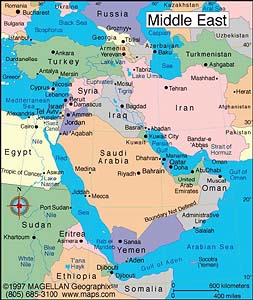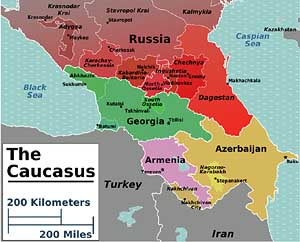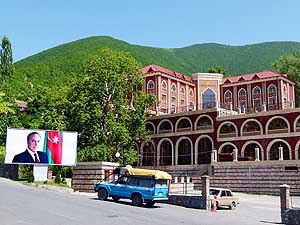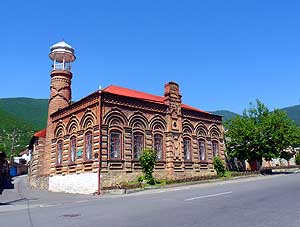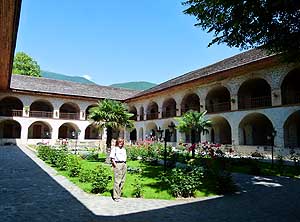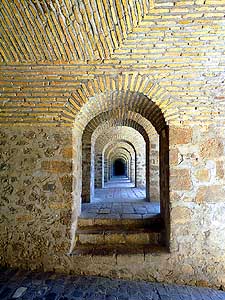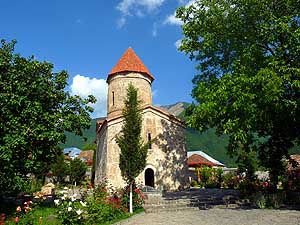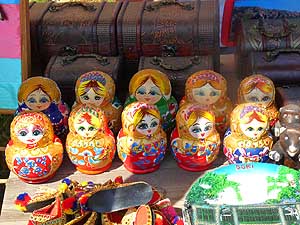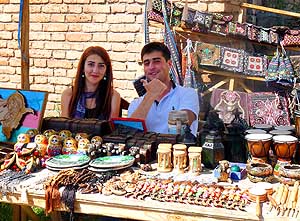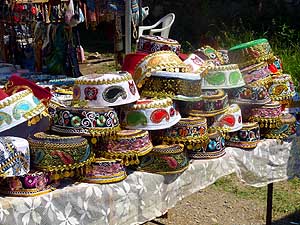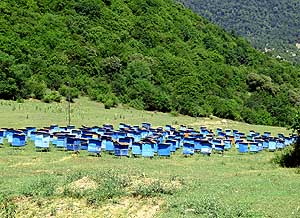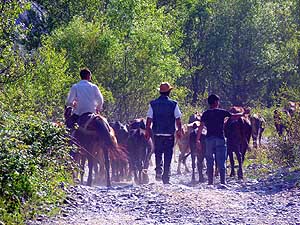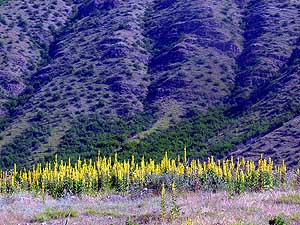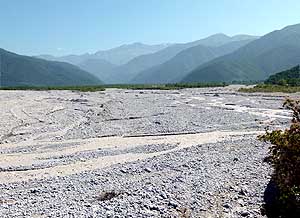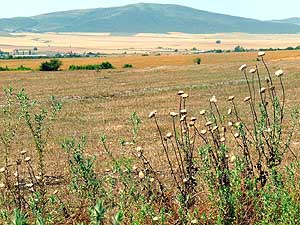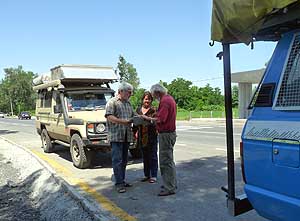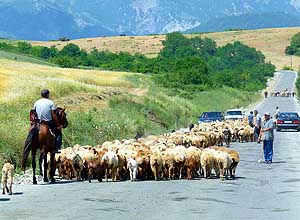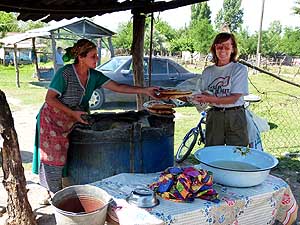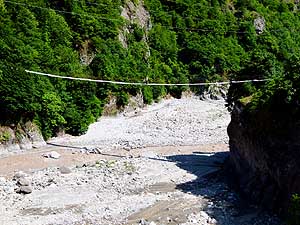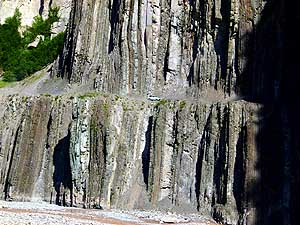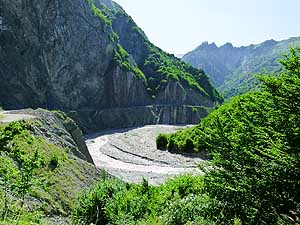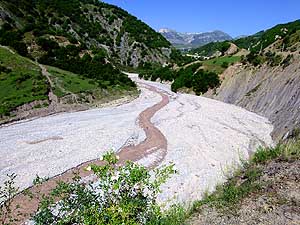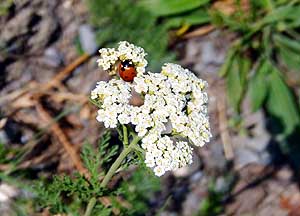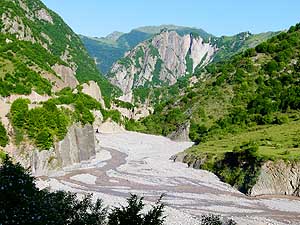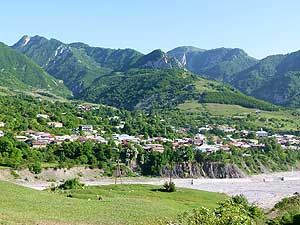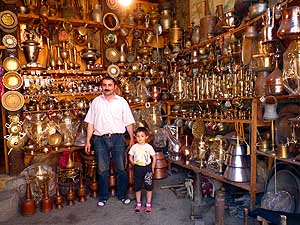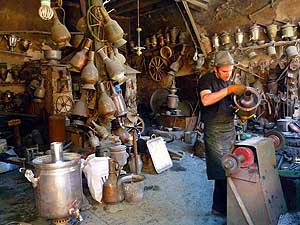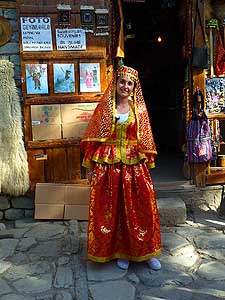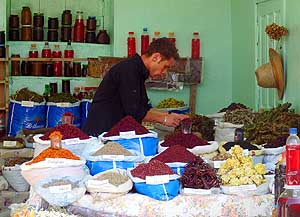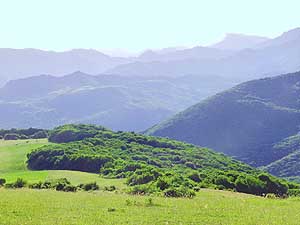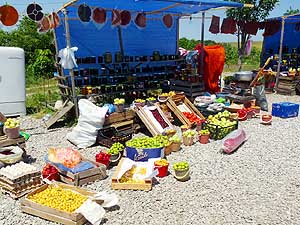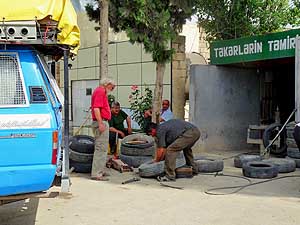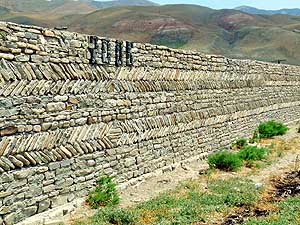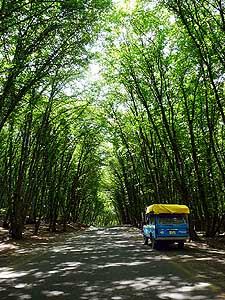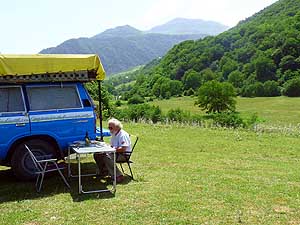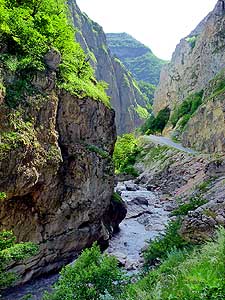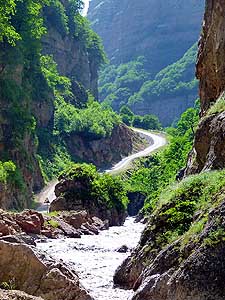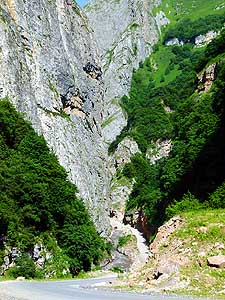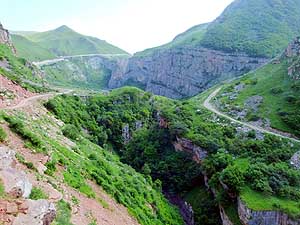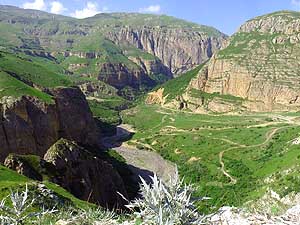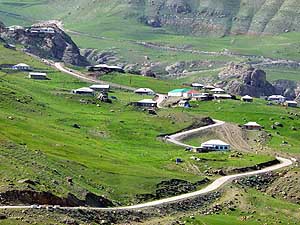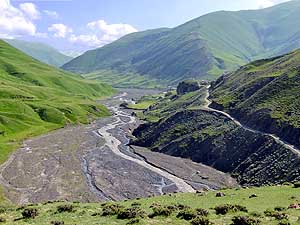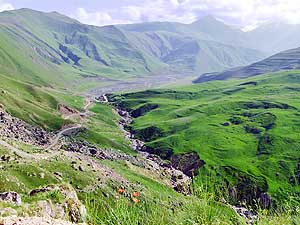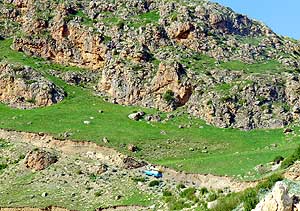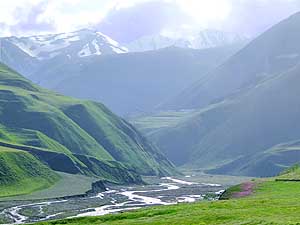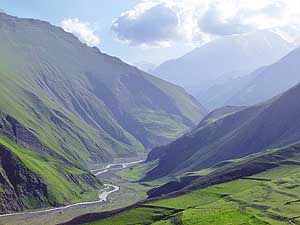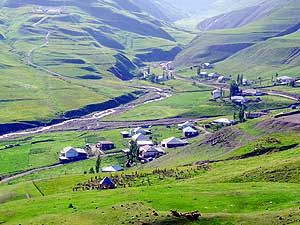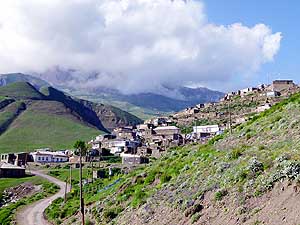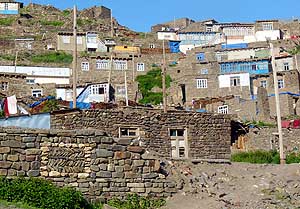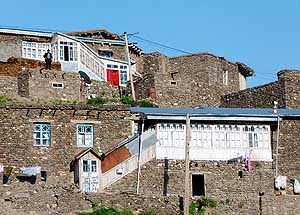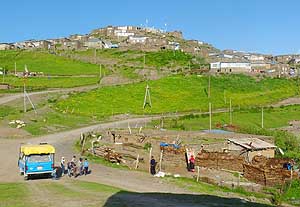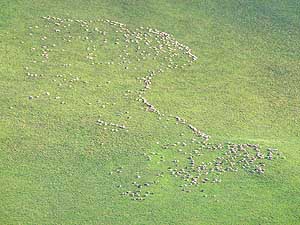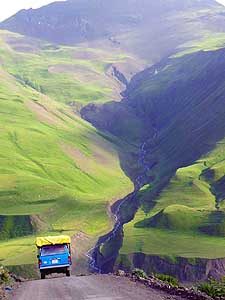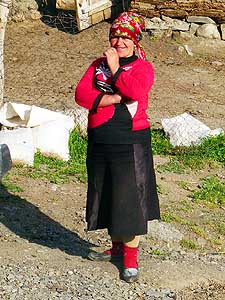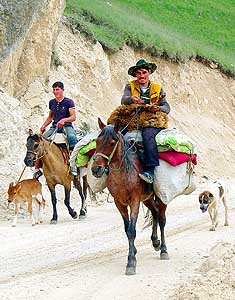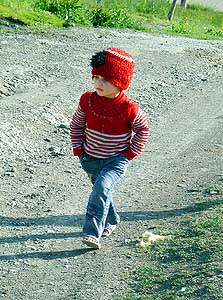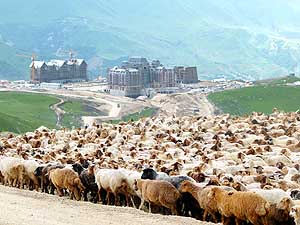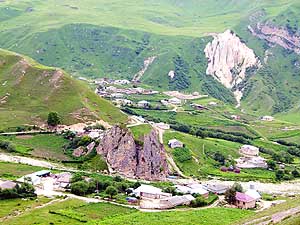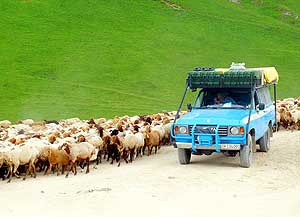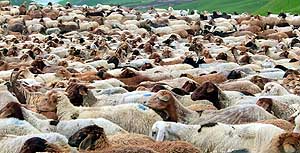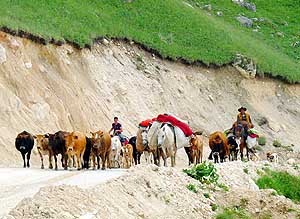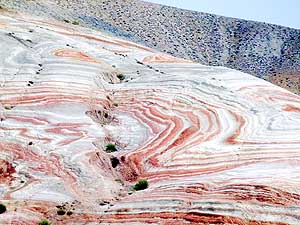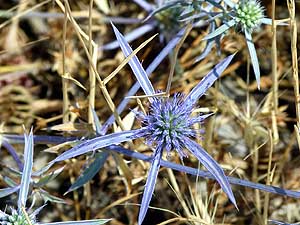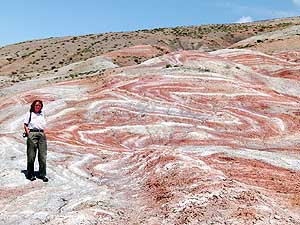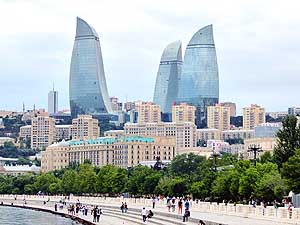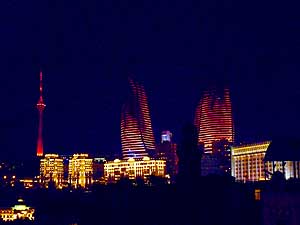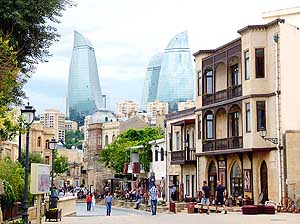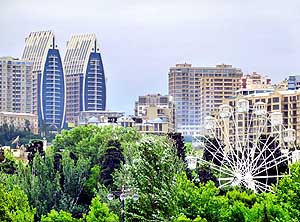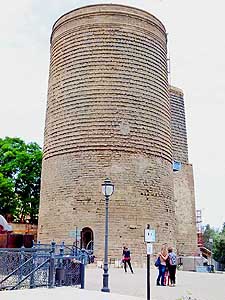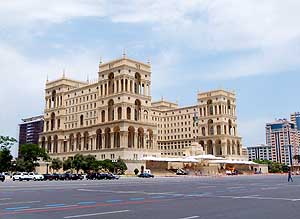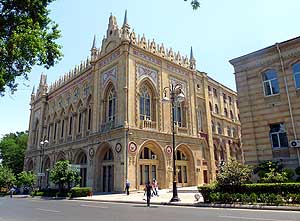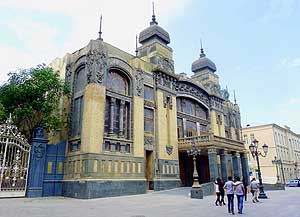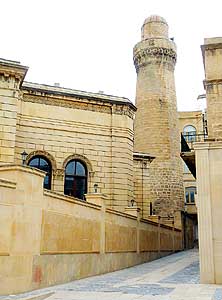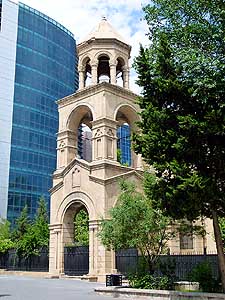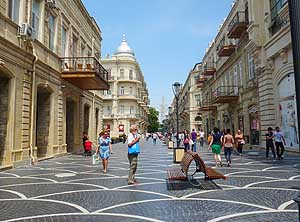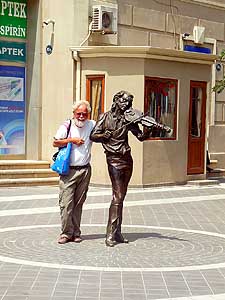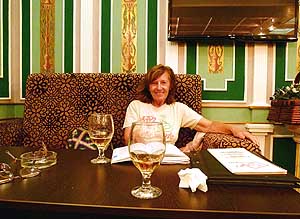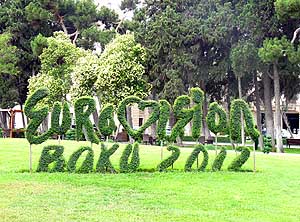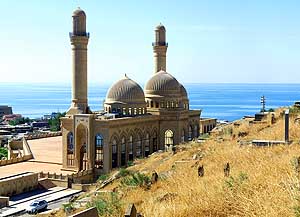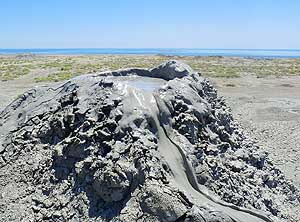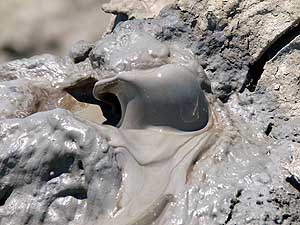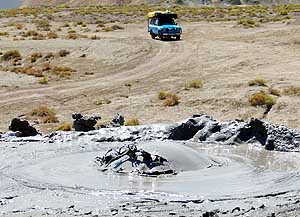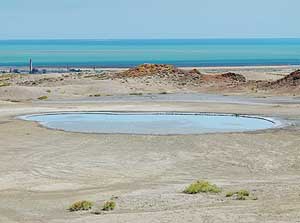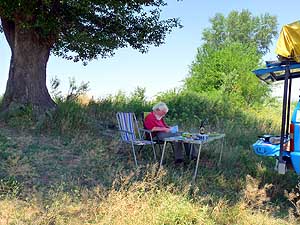![]()
- Pictures of our trip to Azerbaijan
- - From June 13th to 24th, 2013 – Georgia-Balakən-Şəki-Lahıç-Baku-Xınalıq-Quba-Laza-Baku-Gəncə-Georgia Border
- before:
- Georgia Part 1 – June 4 to 13, 2013: Turkey Border - Ajaria - Tbilisi - Kakheti - Azerbaijan Border
- Turkey – May 28 to June 4, 2013: Iran Border - Esendere - Hakkari - Van - Doğubayazıt - Kars - Ardahan - Hopa - Georgia Border
- afterwards in the Caucasus:
- Georgia Part 2a – June 24 to July 2, 2013: Azerbaijan Border - Tbilisi - Armenia Border
- Armenia Part 1 – July 2 to 9, 2013: Georgia Border - Akhtala - Haghpat - Dilijan - Lake Sevan - Selim - Arates - Nagorno Karabakh
- Nagorno-Karabakh – July 9 to 17, 2013: Armenia - Stepanakert - Gandzasar - Martakert - Tigranakert - Tnjri - Shoushi - Armenia
- Armenia Part 2 – 17 to 22, 2013: Nagorno Karabakh - Goris - Tatev - Noravank - Khor Virap - Echmiadzin - Geghard - Gyumri - Georgia
- Georgia Part 2b – July 22 to 31, 2013: Armenia Border - Ninotsminda - Tbilisi - Mtskheta - Kazbegi - Kutaisi - Zugdidi
- Georgia Part 3a – July 31 to August 5, 2013 - Zugdidi - Swaneti - Zugdidi - Abkhazia Border
- Abkhazia – August 5 to 13, 2013: Georgia - Sukhumi - Tsebelda - Novyy Aton - Lake Ritsa - Gagra - Pitsunda - Georgia
- Georgia Part 3b – August 13 to 15, 2013 - Abkhazia Border - Poti - Ferry to Ilyichevsk/Ukraine
Azerbaijan Map
|
||
|
||
|
|
|
|
6/13/2013: The border official at the Lagodekhi border post smiles: ”I was born when you were in Mexico” he tells Emil. He is one of the four uniformed officers who are studying attentively our country ribbon. Hence he is 28 years old, Emil quickly calculates. The other three carrying three and four stars on the shoulders are at a more advanced age. Surprisingly all speak relatively good English and chat casually, but also pose the precise question how we can afford such a long journey. Never before has a customs officer asked that question during the last 173 visited countries. Each door of our LandCruiser is then opened. However the sole question is about wine. We carry only 2 liters which is allowed to import. We have to pay a roadtax of US$40, but nobody mentions an insurance. Emil tells me all this later, because I was forced by the young militarist, who gives way to four cars at a time to cross the customs gate, to get off and take the passenger channel. It takes me less than five minutes, and then I am already at the border exit gate and wait for Emil and our LandCruiser. |
||
|
|
|
| It is already mid-afternoon when we drive our first meters on Azerbaijan roads and it still is very hot, around 8 degrees warmer than in Tbilisi/Georgia. At the first tree offering some shade we stop for a short picnic and are surrounded immediately by hordes of fat horseflies. The blue color of our LandCruiser has to be blamed. Blue is apparently also attracting bees, because most of the beehives along the roads are painted blue. A nearby street vendor shows up and gives us some super aromatic tomatoes. | ||
|
|
|
| The densely forested hills that greeted us at the Georgia-Azerbaijan border give way to yellow wheatfields. In Zaqatala, the next city we first need money for buying fuel as our petrol tank is almost empty. The currency is Manat (AZN). At all banks that we try, the ATM releases only 200 AZN (US$265). But for the moment, it is sufficient, because fuel is here less expensive than in Georgia, about US$2.87 the gallon [€0.57/l]. We check in at the Hotel Zaqatala for AZN 25 (US$33]. In our small, clean room we toast the entry into our 174th country with a five liter bottle of ice cold beer from Georgia from our Engel fridge. Soon after, we are ready for bed. | ||
|
|
|
|
6/14/2013: Breakfast next morning is like in Iran: Butter, cheese, whipped cream, honey and flat bread. Despite that the receptionist acknowledged last night that breakfast is included, it is not. We pay 5 Manat. It is not the amount that annoys us but the misinformation. But our good mood is again restored when we spot the city’s ”Gros Markt” – a big, well-kept supermarket – where we also finally find Whitener for our morning coffee which was not available in Georgia. We buy cherries for Manat 0.82/lb [1.80/kg], apples, mineral water and sour-cherries marmalade from Germany. Like before in Georgia, also here are many products from Europe. Also most of the mini vans are coming from Germany, their names are often still in German. |
||
|
||
|
|
|
| At noon, we leave Zaqatala and continue our journey southwards on M5. Somehow we had another, a more positive vision of roads in the oil country of Azerbaijan. At least, the M5 is not any better than the roads in the neighbor country Georgia. What is apparent is the personality cult of President Ilham Aliyev. He is immortalized everywhere on partly huge road posters, which text, however, we cannot decipher - too strange is the language. It belongs to the Turkic language family. It is also clearly noticeable that the country is a ”men’s society”. We see very seldom a woman among them, be it on the streets, in cafes, in cars, on park benches or garden restaurants. Obvious is also that the country belonged to USSR before 1991 as many things still bear the imprint of the former Soviet Union. | ||
|
|
|
| We reach Sheki (Şəki) mid afternoon, praised in Lonely Planet as Azerbaijan‘s ”loveliest town”. The city sits wonderfully embedded into deeply forested slopes, its main attraction are the beautifully restored stone houses with its unique architecture. I like them, not so much Emil. He finds them too unnatural – too much restored. The Karawanserei Hotel with its fine vaulted brick ceilings, the well-kept garden with roses and flowering bushes reminds us of Iran, only with the difference that there it was real life and here it’s rather a show piece – though a lovely one. The reason we finally end up in the evening at this legendary hotel for 30 Manat (US$40) a night is that we did not find any wild camping spot where we felt safe. It is a Saturday where plenty of alcohol is consumed. When on our chosen spot near the Hunting Lodge cars drive past with drunken bawling guys, we leave again. This region is the playground on weekends. There is one restaurant after the other with its popular eating pavilions. Also an amusement park is not lacking. | ||
|
||
|
|
|
|
6/15/2013: Our room at the Karawanserei Hotel is too dark for breakfast. We are drawn outside to the light and the sun. As soon as we leave Sheki (Şəki) behind us, on both sides of the road whole meadows of long-stemmed bright yellow flower carpets appear – just the perfect breakfast spot. These unexpected moments always fuel the pleasure of our traveling life. Continuing towards Ismayilli (İsmayıllı) leads us along the Greater Caucasus with still snow-covered mountain peaks. It is a beautiful scenery: Golden wheat fields, green forests and the snowy mountains as a backdrop. We are just taking pictures as a beige LandCruiser with German license plates stops right behind us. ”Only European people will stop here to take pictures” Ingrid greets us. She and Klaus are on their way to China. On July 15th, 2013, their Chinese guide is waiting for them at the Torurgart pass in Kyrgyzstan. Therefore they are in a hurry and still want to reach today Baku, the capital. |
||
|
|
|
| We, however, have plenty of time. Our today’s destination is the village of Lahic (Lahıc) northeast of Ismayilli. It is said to be one of the most picturesque mountain villages. After the experience of Sheki (Şəki), we are a bit skeptical. But what awaits us on 3’973 ft. [1’211m] altitude is indeed beautiful. Alone the narrow mountain ride with its stunning scenery is adventurous. Deep below us to the right of the road the silvery ribbon of the Girdimançay River slashes its way through a dramatic gorge down to the plain. To the left high rock walls rise vertically towards the blue sky and in between runs the narrow singe-lane gravel mountain road, cut into the rock. Evening is approaching when we reach the mountain village. There are still some tourist groups lingering around, but soon they leave and we have the place for ourselves. We explore the village road with its traditional houses made of layers of rock and wood and their quaint wooden balconies. At one of the shops we follow the coppersmith at work, at another we take in the smell of strange spices. In many shops copperware and other souvenirs are on sale. When we return after 6pm from the end of the village road to our parking, many shops have already closed. | ||
|
|
|
| We need a place to sleep. A steep and rocky track leads down to the river bed. It is used by large vehicles for which the passage through the narrow village is barred. Our first choice is directly next to the bridge. A horseman herding his cows is passing by and invites us by sign language to spend the night at his home. He only speaks Russian – a reason for us to decline politely. Soon we are the attraction of half of the village. More and more curious people appear on the bridge – time to change place. We hardly set up camp again, when the wind turns and an awful smell of a decomposing animal makes us move again. At 11pm things are right and we go to sleep. | ||
|
|
|
|
6/16/2013: The village is still asleep when we get up and realize that the rear right tire loses air. We inflate it up and hope to be able to reach the next tire repair shop. A shepherd high on horseback is already leading his cattle to the feeding ground when we start to tackle the steep stony 4x4 ascent from the riverbed back to the road. Please no real flat tire now! We have none, but the air leaks steadily, though slowly. At the loveliest lookout with views to the canyon and the thundering river below us we take breakfast. Soon Lahic will brim again with tourists The Sunday traffic has already started. |
||
|
|
|
| Slowly we make our way back to the M4 road. In Shamaki (Şamaxı), the first bigger town, there is a tire repair shop next to a gasoline station. But because the tube only loses little air, we optimistically postpone the repair to tomorrow and drive first the further 17½ miles [28km] to the Shamaki Astronomical Observatory from the Soviet era in Pirkuli. Beekeepers who sleep beside their beehives, sell honey along the street. For a small glass they want $12, for a bigger the double. It seems too expensive to us. The silvery domes of the observatory sparkle already from far. It unfortunately is still under renovation and closed for visitors. We are again on an altitude of 4’708 ft. [1’435m] and decide to spend the night in the coolness of the mountains. On an overgrown path that gets worse and worse and where we expect no more cars, we set up camp. When the sun disappears behind the mountain crest and a strong wind starts blowing, it gets really chilly. | ||
|
|
|
| Last night it was wishful thinking to sleep once without disturbance. Somewhen after midnight we jump awake by flaring headlights. Immediately we are alert and alarmed. But we are lucky, the car drives past us. When early morning we step out of the car, a fierce wind is blowing forcing us to take breakfast inside our LandCruiser. Right afterwards we head to the tire repair shop in Shamaki. The team is friendly, the tiny hole in the tube is quickly repaired, and within half an hour we are on the road to Baku, the capital of Azerbaijan with a population of more than 2.1 million people. There we check into the Araz Hotel with own parking for a pricey AZN 60 (US$80)! whereby wifi is not even properly working. | ||
|
|
|
|
||
|
6/17/2013: On the hotel parking, the English motorbiker Graham, whose motorbike has drawn already our attention in front of a motel in Sheki (Şəki), is repairing his machine. We can help him out with some tools. He is waiting for his Turkmenistan transit visa and complains that it is valid only for three days from the issuing date (Remark: The transit visa was valid for 5 days in 2016). Otherwise a guide is mandatory in Turkmenistan. And the ferry from Baku to Turkmembaschi is said to run very unreliably, he adds (Remark: The ferry from Baku to Aqtau in Kazakhstan was said to be more reliable - www.acsc.az). At the moment he hits an all-time low: ”Last night I played with the cuddly kitten of the hotel. I thought: Why do I not go home and play with kitten there?” he expresses his actual state of mind. We understand him very well because life on the road is not always easy. Next morning both check out, for both the hotel is too expensive. He is heading South to one of the ports of Baku or Alat, and us North direction Dagestan/Russia. |
||
|
|
|
| On the fast highway it’s about 100 miles [160km] to Quba, the last bigger town 25 miles [40km] before the Russia border in the North. From there we want to venture the 36 miles [58km] mountain road to the remote hamlet of Khinalig (Xınalıq). As soon as we leave behind the towns popular ”İstirahət zonaları” the ”rural bungalow resorts” which line the road, we find ourselves in pure nature. We never expected to still find such a wild and spectacular landscape in Azerbaijan: Dramatic gorges, bizarre cliffs and towers, and on the high plateau wide, green pasture, framed by snow covered mountain peaks. Often we have to engage 4x4 in order to tackle the up to 35% steep and precarious passages. But our LandCruiser shows itself from its best side and manages it easily up to Khinalig, sitting on 7'710 ft. [2’100m] altitude. What an unforgettable stunning ride under a steel-blue sky and soft evening light. | ||
|
|
|
| Shortly before the village there is a modest little hut with an open barrier. Nobody is there to cash-in the access fee to the village of 4 Manat (US$5.30) per person. As soon as the village, sitting on the summit of a hill, comes into sight, children appear. They are not begging, they just stick to our heels and babble cheerfully despite that we do not understand a single word. Khinalig is a mountain village exuding an unbelievable rural charm. Pack mules are tied up in front of houses, calves and cows are roaming around freely, families of geese wander around in the grass, a mother is washing vegetables in the village fountain with her little son. Dried cow dung is piled up to fences – the heating material for the long and cold winter season. In the meantime there are three families offering accommodation. We prefer a quiet bush camp and being at the end of the road, we start our descent in the most beautiful evening light. We are not in a hurry. It gets dark only towards 10pm. Finally we set up camp at a meadow on 3’937 ft. [1’200m] altitude. | ||
|
|
|
|
6/18/2013: ”Do you hear it? The cuckoo is calling from the woods?” Emil asks me at breakfast. No, I cannot hear it. Since I have to wear a hearing aid, my hearing acuity has diminished. Some frequencies reach me better than others. Nevertheless, I enjoy the begin of the new day out in the countryside and listen to the chirping birds around us. At 9am we are already on the way to our second mountain tour: To the village of Laza in the Qusar valley ‘next door’, which Lonely Planet described also as spectacular setting. For the construction of the Shahdag (Şahdağ) Ski Resort, the previously adventurous track has given way to a tarmac road, inaugurated in December 2012 by the Head of State. At least this is what we read in the internet. |
||
|
|
|
| What we get to see however, is a disillusion deep to the bone. Not a trace of tarmac awaits us, only a dusty, although wide track and a never ending construction site. To gain building material for the oversized skiing area, whole hills are removed. Heavy trucks crawl nonstop up and down the site. Even a Turkish 40-ton vehicle is pulled up by a loader. The whole region is covered with construction debris – the absolute anticlimax. The skilift station is already completed, but three still unfinished buildings show the madness of the project. | ||
|
|
|
| We encounter a herd of cattle, guided by two horsemen. One of the horsemen is kicking badly a sheep and tears it then by its legs onto the horse. Minutes later appears a huge herd of sheep – there must be hundreds of animals – in a close line down the hill. Emil observes how the horseman and the sheep herder start quarreling with the result that the horseman throws the maltreated sheep to the herder’s feet. This moving episode still bothers us for a long time. Finally ”glorified” Laza appears – one disappointment more! Admittedly it’s situated in a nice valley, surrounded by the high Caucasus mountains, e.g. Mount Shahdagh 13’921 ft. [4’243m] or Heydar Peak 12’306 ft. [3’751m], but it isn’t worth the long journey resp. detour in comparison with the previously visited Khinalig. | ||
|
|
|
| Deeply disappointed and depressed we start our return journey to Quba, discussing about what happened with the sheep. With the construction of the Shahdag Ski Resort two worlds are now colliding: The one of the herdsmen who have always used it as grazing ground for their animals and the one of ”profit”, of greediness. To make our anticlimax day complete we get the visit of a policeman with four stars while having lunch along the river. ”The folder he carries along probably contains fine tickets” Emil mutters. Without any friendly word he asks for our passports and browses through the pages for a long time while we wash our dishes. Still without loosing a word, he returns them and walks away. In the evening, we end up at the Terrace Hotel in Quba after having bargained the price down to AZN 50 (US$66.50). Since a long time we sleep nine hours in a row without any disruption. | ||
|
|
|
|
6/19/2013: At breakfast we investigate again, if it is really included. A guest who speaks some English confirms ”Free price”. All the more we are surprised when Victor, the waiter, runs after us while we are packing. The only thing we understand is ”coffee!”. Does he possibly want to charge us for the coffee as normally tea is served at breakfast? We play dumb and drive away. |
||
|
|
|
| About 100 monotonous miles [160km] back to the capital Baku are ahead of us. Only about 10 miles west of Gilezi (Giləzi) along the road to Khizi (Xızı) there is an attraction worth visiting: The small pink and red striped conical colored mounds, called ”Candy Cane Mountains”. It is a deserted windswept region, just how we like it. When we think to have seen the loveliest, a new one looms. The area extends for some kilometers. Today we have to skip our warm lunch, which would have been hash browns, too strong is the blowing wind. Cooking outside as we have to do is unthinkable. Therefore we only get to eat a bite late afternoon when we check into the very expensive Araz Hotel in Baku. | ||
|
|
|
|
6/20/2013: After I washed our LandCruiser at the hotel parking in the morning – a self imposed duty that I like to do – we check out to look for a cheaper hotel closer to the Old City. Through the ever congested traffic we finally reach the city center. In the heart of the historic district, we end up at the Horizon Hotel. Our LandCruiser finds a secured parking outside the Old City walls for AZN 1 (US$1.35) a day. A few minutes later, we are already afoot on our sightseeing tour. |
||
|
|
|
| With Emil and the Lonely Planet as guide we stroll for hours through the old city with its winding alleyways and along modern Baku with the pedestrian zones lined with boutique hotels, shops and garden restaurants. We admire richly decorated buildings from the Soviet era such as the Opera House, the Presidium of the National Academy of Sciences and the Nizami Museum and end up at the Seashore Boulevard, a meeting point for young couples in love. Only a few meters apart, they cling deeply embraced to each other. After we traveled a rather long time in Arabia, where showing this kind of affection in public is taboo, we are a bit astonished about it in this predominantly Muslim country. | ||
|
|
|
| The landmark of Baku, the 95 ft. (29m) tall ”Maiden Tower”, built from stones, is on our way back to the hotel. It is under construction so that it is not possible to climb it. One of the legend has it that a wealthy ruler falls in love with his daughter and asks her to marry him. Shocked by his proposal but unable to disobey, the daughter orders him to first build her a tower high enough to be able to overlook all of his estates. Only then she will decide. When the tower was completed, she climbed to its roof and jumped down. | ||
|
|
|
| In the evening, when we climb up the many steps to our room on the third floor tired but happy, we both agree: Baku with its mix of east and west as well as old and new is an interesting town. As soon as the night engulfs the city, the three glass towers in the shape of flames – also called ”Flame Towers” – rising 623 ft. [190m] above the city, start their display of colors – from flaming crimson and yellow right up to the colors of the country’s flag. And we have the pleasure to watch it right from our room window. It is a wonderful sight before our very eyes. Sitting on the edge of our beds, we enjoy this wonderful show until we fall asleep. | ||
|
|
|
|
6/21/2013: No street noise affected our sleep. It was complete silence. What a privilege for the residents of the Old Town. Under a blue sky we leave Baku in southwest direction. After about 33½ miles [54km], we turn off 9 miles [15km] south of Qobustan on a very badly washed-out earth track and follow it for two miles [3km]. There the natural phenomenon on the Dasgil Hill (Daşgil) appears – the little conical mounds, called also ”baby mud volcanoes”, which gurgle and bubble and now and then spit out a thick grey mass of earth. Still flowing, not yet hardened patches are all over. Knowing that they are still active and unpredictable gives us a kind of thrilling feeling. |
||
|
|
|
| ”Be careful” I shout horrified to Emil, as he puts his finger into the bubbling mass. He grins: ”The mass is cold not hot”. As soon as the other two vehicles have left, we are on the lookout for a nice lunch spot and find it. The site is beautiful: On both sides we have a view to the Caspian Sea, which today is shining in deep blue. Should we camp here? Being only 2pm and dusk falling only at 10pm, we decide to push on towards the border of Georgia. | ||
|
|
|
| In Alat (Ələt), we turn off to the west. From here it is a monotonous drive through a swampy plain. Nice is merely our lunch spot under a shady tree in a meadow full of flowers. Here Emil is able to relax with a beer from the heavy truck traffic, the criminal way of driving and from the deep holes and ditches. Also our LandCruiser deserves a rest, It had to endure many hard bumps and bangs. When Emil later lies underneath the car at the Karawanserei Hotel in Ganja (Gəncə), the second largest town in Azerbaijan, he sees the mess: The main spring leaf at the right front is broken. Tired from the long hard drive he postpones the repair to tomorrow. | ||
|
|
|
|
6/22/2013: Nights in hotels on Saturdays are seldom quiet. At 2am a group of drunken guys jump roaring into the swimming pool right below our window. With little sleep we get up early. After half an hour work, Emil has fixed the spring leaf with a clamp and we are ready to drive off. It becomes only a short drive. At the AZ Petroleom Hotel of the same-named gasoline station in Ikindzhi-Shikhly (İkinci Şıxlı), about 25 miles [40km] before the Azerbaijan-Georgia border post ”Red Bridge” (Qırmızı Körpü) they rent small rooms. Wanting to cross the border only next morning, we stay. It becomes our last night in Azerbaijan. |
||
|
|
|
|
||
|
6/23/2013: At 9am we already queue up behind a line of passenger cars at the Azerbaijan’s exit border post. Trucks have their own line. The first one taking care of us is a young militarist who speaks good English. He questions this and that. Then he points to our country ribbon. ”Why is my country not mentioned?” he wants to know. We do not want to tell him the real reason, namely that it is because of our next country Armenia, which is still in disarray with Azerbaijan due to Nagorno Karabakh. But Emil’s excuse that somebody removed it again, is accepted. Then like at the entry, the money question is raised again. Only when we tell him that we get now the government pension, he is satisfied. We receive back our stamped passports and say good-bye to Azerbaijan, a country that welcomed us positively and had many unforeseen surprises in store. |
||
|
|
|
|
||
